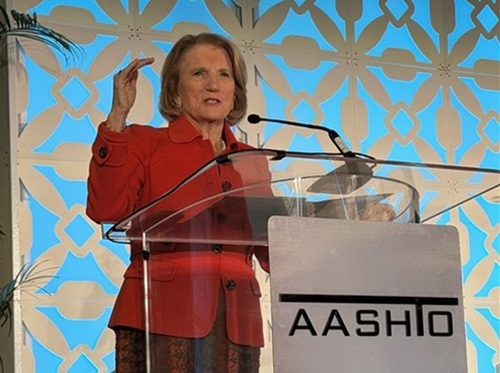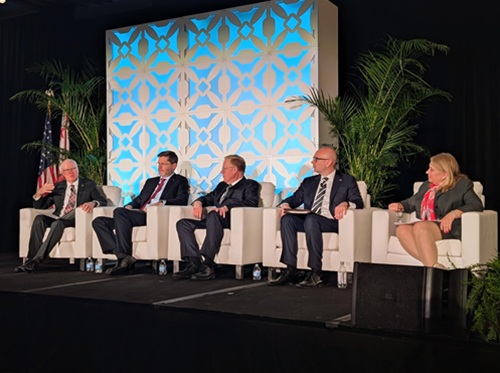The plenary session of the 2024 Transportation Research Board’s Annual Meeting in Washington, D.C., focused on ways to address the mental health issues of the transportation construction workforce.
[Above photo by AASHTO]
Diane Gutierrez-Scacetti – commissioner of the New Jersey Department of Transportation and now chief of staff for New Jersey Governor Phil Murphy (D) – moderated a panel discussion regarding ways to address the industry’s mental health needs as the outgoing chair of TRB’s executive committee.
She was joined by Dr. Carol Lewis, TRB’s incoming chair and director of the Center for Transportation Training and Research at
Texas Southern University; Dr. Sharareh ‘Sherri’ Kermanshachi from Penn State University; Travis McCarthy, senior vice president at Sundt Construction; and Peter Tateishi, CEO of the Associated General Contractors of California.

“We cannot break the stigma about mental wellness and the high rate of suicide among construction workers unless we discuss it,” noted Gutierrez-Scacetti, describing it as “one of our biggest issues” as the transportation sector recovered from the impact of the COVID-19 pandemic.
Dr. Lewis noted that the construction industry has second highest rate of workforce-related suicide, second only to the mining industry. “It is a very sobering topic and we in the transportation community need to play a role in solving this issue,” she stressed.
Dr. Kermanschachi explained that suicide is the “very unfortunate end point after a long, difficult journey” for most people, but there are specific factors contributing to this issue in the construction sector that concerns the nature of its jobs.
“These are very demanding jobs with tight schedules, long hours, and many work/life balance issues,” she said. “There is also a stigma around mental health – it is not talked about much. Not only do we have to remove and overcome this stigma – for we have treatments available – but we need to support paid time off for workers to address mental health issues.”
Another issue is that not all construction workers are fluent in English, so they need community-based organizations to support them in their own languages to improve mental health outcomes.
“Because a suicide is not just about losing a worker; that suicide is also a loss for the company and society – it is a lose-lose-lose situation for everyone,” she said. “So we need to do whatever we can do to stop this trend. We need more education, especially for the younger generations of workers, and keep our eyes on our colleagues. The responsibility is on all of us.”
Sundt’s McCarthy added that while the topic of worker suicide in construction is not a new topic, all the signs point to it not getting better. “The construction industry looks at workers being ‘fit for duty’ – that they are physically able to do the work. We now need to make that fitness connection to mental health,” he said. “Because it is not just number of claims for mental health that are rising but the costs are rising as well.”
McCarthy noted that Sundt’s program for addressing this issue is broken down into three aspects – mental wellness, mental health, and suicide prevention.
“Mental wellness is about managing what we call ‘day-to-day’ stuff – such as family issues, financial issues, and burn out,” he said. “Mental health is where we deal with substance abuse and other forms of addiction, followed by suicide prevention efforts. And we bring conversations about those issues not just into our offices and orientation programs but out to our project locations as well.”
Overall, McCarthy said the construction industry must keep “leaning in” on the mental health issue, though it is far from an easy topic to deal with. “But since human lives are involved, this is a top priority for all of us,” he stressed. “We have to place the same emphasis on this as we do with job site safety.”
AGC California’s Tateishi agreed with McCarthy’s view, noting that that the construction industry has done a “great job looking at the physical safety of job sites over the last 20 years” but that it is “now time to talk openly about mental health issues. We need mental health ‘stand downs’ on job sites to discuss it, to show to our people that this is a priority; that this issue matters.”
He added that it is critical to “see this as a human problem, not necessarily a construction-specific problem. We need a more global conversation on mental health for it is an ‘all-age’ problem.”
Most importantly, he said everyone involved in transportation construction – from the infrastructure owners on down to the highway contractors – needs to “join us in this conversation” and “give permission” to talk about mental health on their job sites on a regular basis.
“Let’s keep the awareness up – that will help change everything,” Tateishi stressed.
 Top Stories
Top Stories
Congressional Leaders Detail Key Transportation Priorities
February 26, 2026 Top Stories
Top Stories

